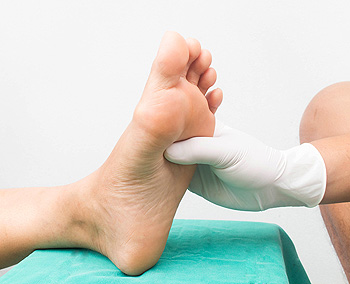Checklist for Diabetics to Protect the Feet
Tuesday, 26 July 2022 00:00
Anyone with diabetes is subject to foot and lower leg problems, including ulcers, gangrene, and possible amputation. These conditions may be the result of long-term high blood sugar levels, which can cause neuropathy and peripheral artery problems. For that reason, as a diabetic, constant and vigilant care of your feet is essential. If you are unable to check your feet, please ask someone to help you. Some people use a mirror to check the bottom of their feet. Look for changes in skin color; red indicates a problem with your footwear, but blue or black could mean bruising or blood flow problems. Look for blisters or any break in the skin that could become infected. Keep these areas clean and dry, and apply sterile coverings. Check for moisture between the toes, which is a good place for bacterial or fungal infections, such as athlete’s foot, to develop. Notice any numbness, tingling, or inability to detect temperature, hot or cold. Look for sores that do not heal properly, because they may become ulcerated. As a diabetic, it is a good idea to have regularly scheduled visits with a podiatrist who can help to monitor changes to your feet and treat them quickly.
Diabetic foot care is important in preventing foot ailments such as ulcers. If you are suffering from diabetes or have any other concerns about your feet, contact one of our podiatrists from Coastal Foot & Ankle Wellness Center, LLC. Our doctors can provide the care you need to keep you pain-free and on your feet.
Diabetic Foot Care
Diabetes affects millions of people every year. The condition can damage blood vessels in many parts of the body, especially the feet. Because of this, taking care of your feet is essential if you have diabetes, and having a podiatrist help monitor your foot health is highly recommended.
The Importance of Caring for Your Feet
- Routinely inspect your feet for bruises or sores.
- Wear socks that fit your feet comfortably.
- Wear comfortable shoes that provide adequate support.
Patients with diabetes should have their doctor monitor their blood levels, as blood sugar levels play such a huge role in diabetic care. Monitoring these levels on a regular basis is highly advised.
It is always best to inform your healthcare professional of any concerns you may have regarding your feet, especially for diabetic patients. Early treatment and routine foot examinations are keys to maintaining proper health, especially because severe complications can arise if proper treatment is not applied.
If you have any questions please feel free to contact one of our offices located in St. Augustine, and Palatka, FL . We offer the newest diagnostic and treatment technologies for all your foot and ankle needs.







